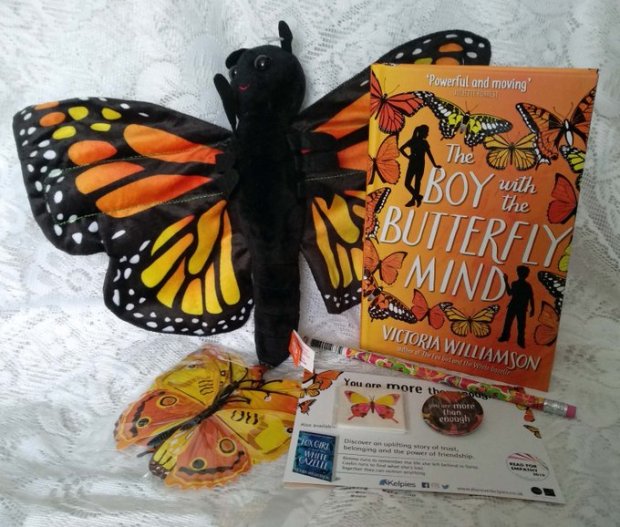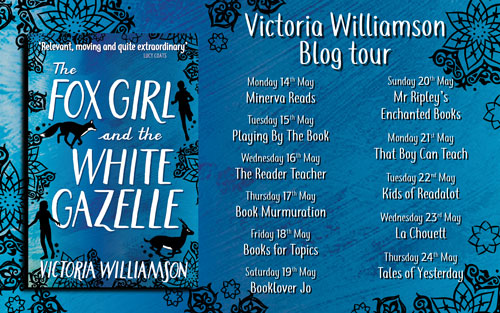
‘Truly sensational. Told through two voices and suffused with real heart; empathy and emotionally-invested storytelling at its best that has so much to teach today’s children. My heart genuinely aches. A must, must, must read.’
Rating: ⭐⭐⭐⭐⭐
Title: The Boy with the Butterfly Mind
Author: Victoria Williamson (@strangelymagic)
Illustrator: Floris Books (@FlorisBooks)
Publisher: Kelpies (@DiscoverKelpies)
Page count: 264
Date of publication: 12th September 2019
Series status: N/A
ISBN: 978-1782506003
Perfect for Year 5, Year 6 & Year 7.
#3Words3Emojis:
1. Heart 💖
2. Family 👨👩👧👦
3. Butterflies 🦋
It doesn’t matter what I try.
There’s no cure for being me.
Jamie Lee wants to be normal. But his ADHD makes him feel like his brain is full of butterflies.
Elin Watts wants to be perfect. If she can be, surely her dad will come home.
When Jamie and Elin’s families join, chaos and order collide. But perhaps they have something in common. Maybe there’s no such thing as normal, or perfect. Maybe being yourself is more than enough.
Review:
Told through a two-voice dual perspective that’s soon becoming Victoria’s inimitable style of storytelling, The Boy with the Butterfly Mind tells the stories of Jamie and Elin, who unbeknownst to each other at the start of the book, become part of the same blended family.
The difference between the two protagonists is immediately noticeable. As the character of Jamie is introduced to us through his struggles with his work at school, we see on the flip side that Elin is thriving academically. However they actually have more in common than first appears. Yes, they’re both eleven years old but actually they’re both finding it hard to ‘fit in’ and it soon becomes clear that socially they stand out amongst their classmates.
Reading on, the two’s home dynamics are shared with the reader and it is clear that both of these characters are experiencing very complex and fractured family breakdowns. With Jamie, he soon becomes a spare part as his mother wishes to move to the United States with her new partner who isn’t that tolerant of Jamie’s ADHD, forcing him to move in with his father who’s living with his own family. Whilst Elin is a pure perfectionist who distracts herself from her father walking out of the family home by whiling away her time in fairyland writing fictional stories based on the real-life characters around her, believing that if she is perfect enough her dad will soon step back into her life.
Through this chain of events, Jamie and Elin find themselves all living under the same roof, though Elin assures herself that it won’t be for very long as when Jamie comes to stay, his behaviour and the changes in her life soon sends her up the wall. Will she feel that she can continue to live with him? What will change her attitude towards him? Can they live harmoniously?
Victoria yet again gets in to not only the heads but also the hearts of her characters and this story will surely permeate in to not only the heads but also the hearts of its readers. This is a story of self-discovery, suffused with real heart and bursting with empathy, with so much to teach today’s children.
It takes an author with immense compassion, with perception and with to not just recognise the complexities, intricacies and eccentricities that are weaved into this story but to also write them with a nuance that shows that when it comes to emotionally-invested storytelling, Victoria really is in a class of her very own.

A Summer Adventure on The Book Bus
When you think of a mobile library, what’s the first image that comes to mind? If you’re anything like me, then it won’t be any of these:
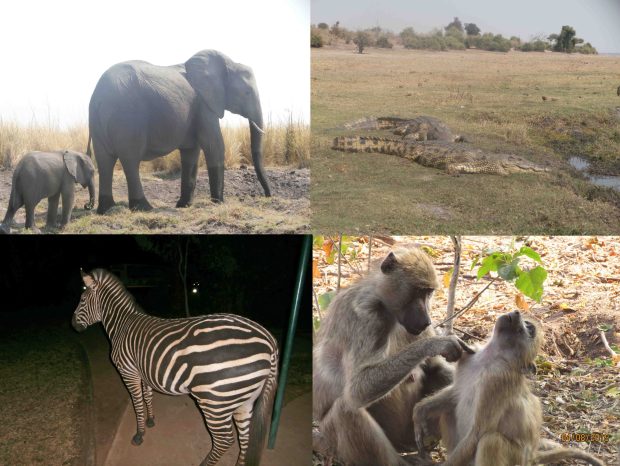
But volunteering with The Book Bus in Zambia, elephants by the side of the road, tame zebras, cheeky monkeys and crocodiles in the rivers are part and parcel of the reading assistant’s everyday experience.
This summer I spent four weeks working on Book Bus Charlie in Livingstone, visiting local communities and helping run story and craft activities in the primary schools and libraries which the reading charity has partnered with. It was a unique experience, but the project is something that anyone with a passion for books, children’s literacy and international development can get involved with, either through volunteering, or donating to keep the buses on the road and the bookshelves full.
The Book Bus charity was founded in 2008 by publisher Tom Mascheler, and initially began work with schools in Zambia, before opening further reading schemes in Malawi and Ecuador in 2010. Each Book Bus programme is run by local teams all year round, who work alongside teachers to provide literacy support and literary schemes to improve the children’s overall education standards. The teams also run regular reading sessions at community and public libraries, with the staff in Ecuador running an after-school programme of remedial reading sessions for children struggling in the classroom. Over the summer, international volunteers are invited to join the Zambia project for between two and four weeks, planning and running story sessions, reading activities, and crafts in the primary schools and libraries around Livingstone.
That’s the background, but what’s the actual experience of being a volunteer like?
Well, the day starts early on Monday-Fridays, with breakfast from 7am depending on how far away the school to be visited that week is. Planning for the morning’s activities has already been done in pairs or small groups the afternoon of the day before, so after a quick check to make sure you have all the books, colouring pencils, crayons, scissors and craft materials you need, Charlie sets off from the Lodge.
It’s hot during the dry season, so don’t forget your hat, sandals and sun screen!
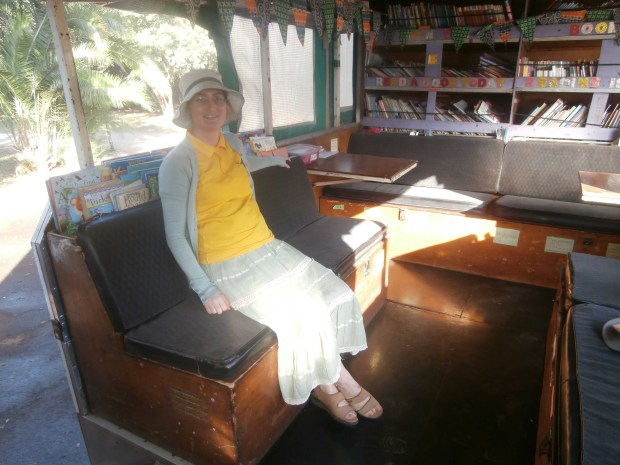
The roads to the schools around Livingstone can be narrow and often lack tarmac, so Book Bus Charlie’s driver, Edward, has to take it easy on the tyres over potholes and slow down as branches brush past the windows, making sure the bus and its occupants all get to the schools in one piece! This gives the volunteers plenty of time for sight-seeing along the way, and elephants and zebras are often spotted along the road through the national park.
Reaching the school, the team sings songs with the children in a big group, often learning local songs and dances in return, before splitting into smaller groups in classrooms and on mats outside. For the next few hours the Book Bus staff and volunteers, often assisted by the school’s teachers, read a story book with the children, followed by songs, activities and crafts based around a chosen theme.
This year’s theme was, very appropriately, ‘Animal Planet’, and all of the books and activities chosen were based around animal stories. At the start of the week, a group working with the older children might look at a book such as Usborne’s Big Book of Animals, helping children read information about the animals, locate where those animals live on a map, and draw pictures of animals they’ve learned about for hanging on the classroom wall or for taking home.
Later in a week, once the team has had a chance to gauge the children’s reading levels and English vocabulary, they might choose sets of story books that the children will be able to read along with. One that worked very well this year was The Tortoise’s Gift: A Story from Zambia by Lari Don and Melanie Williamson. The children enjoyed making lion masks, monkey finger puppets and a giant tortoise to act out the story at the end of the week.
After packing the books, mats and craft materials back onto Charlie, the team sings some final songs with the children before heading back to the Lodge for lunch and planning for the next day’s activities. Tuesday and Thursday afternoons are spent in one of the local community libraries, reading one-to-one with children and helping them develop their literacy skills and English vocabularies. This is particularly important as English is the official language of Zambia, however there are a total of 73 languages spoken in the country, and children are taught in their local language in Grades 1-3 in school, and are taught in English from Grade 4, which can be confusing in terms of learning to read a new set of phonics to go with all of the new English words.
On returning to the Lodge, volunteers have the chance to wash away the dry season dust, have dinner, continue planning, or have some time to relax. This year some of the evening activities involved card games, roasting marshmallows over a brazier (while trying to stop them being eaten by the tame Lodge zebras!) and singing campfire songs with the group of Girl Guides who joined the project for several weeks. One of the highlights of working with The Book Bus is being part of a team of enthusiastic volunteers who have come together to share their time and effort for a common purpose. As one former volunteer on Book Bus George said: ‘Because of the length of time the project has been running, and the impact it has had, everyone recognises George (not to mention the yellow shirts!), and you immediately become part of the community, rather than just another tourist. Children wave as the bus goes past, shouts of “Book Bus!” accompany any journey by George on the road, and the children suddenly appear at school once George is parked.’
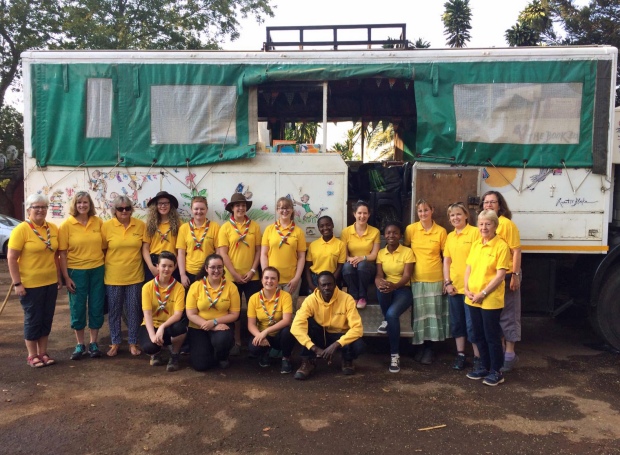
Does it sound like a project you’d like to get involved with? Find out more about The Book Bus, volunteering and donating here: https://thebookbus.org/
Giveaway!
To celebrate the publication of The Boy with the Butterfly Mind, Victoria has kindly given me this butterfly BUNDLE to give away!
If you’d like to be in with a chance of winning this beautifully emotional story, simply retweet (RT) this tweet!

Be sure to check out the rest of the The Boy with the Butterfly Mind blog tour for more exclusive guest posts from Victoria & content & reviews from these brilliant book bloggers!



